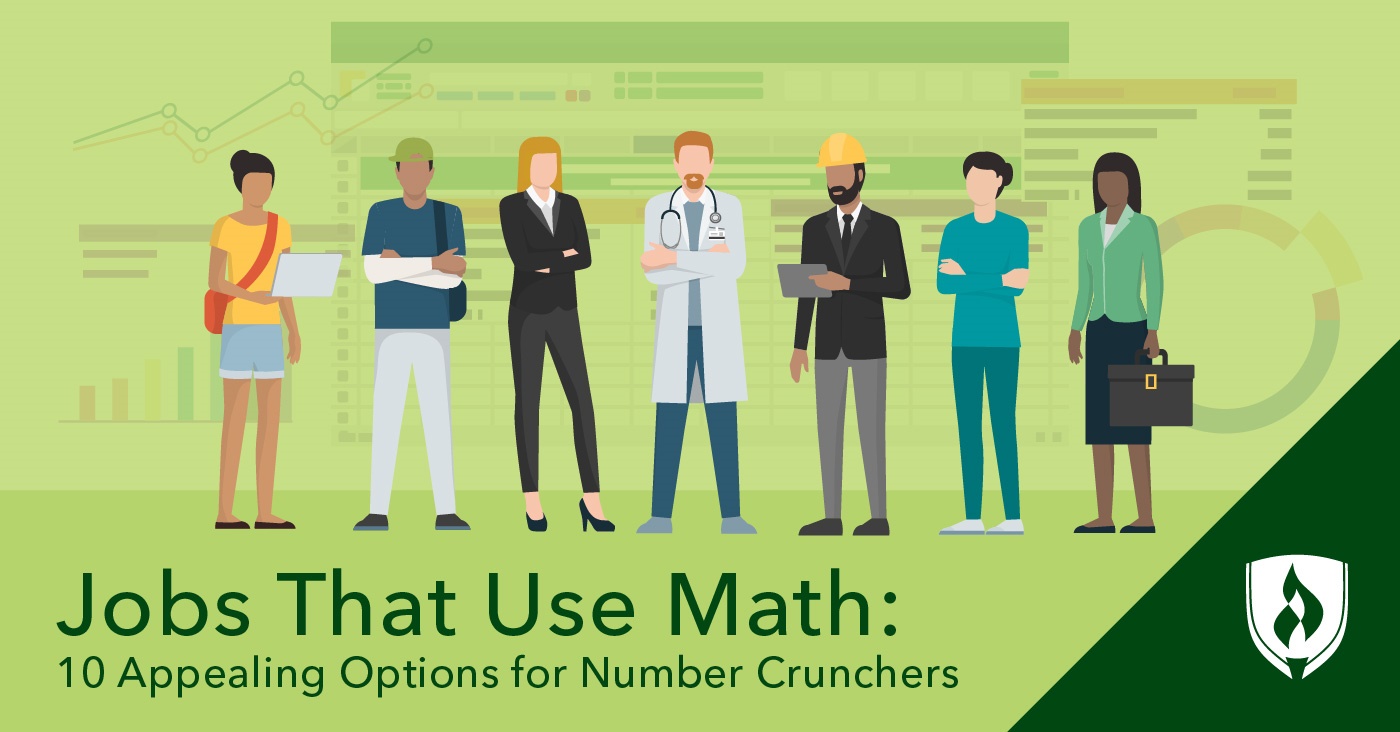
You’re good with numbers. Math has always been fun for you, and you love the way it helps clarify and solve problems. Maybe you’re beginning to consider ways that you could use this strength in a future career, but being a math teacher or a mathematician isn’t quite the direction you want. So what else is out there?
Fortunately for you, there’s a huge variety of jobs that lean on mathematics skills to some extent—likely too many to list in one place. That said, we can highlight a few compelling options that may be flying under your radar.
10 Intriguing jobs that put math skills to use
Regardless of where your interests lie, there’s an opportunity for you to leverage your love of math to make a living. Learn more about these ten options:
1. Health informatics specialists
Health informatics specialists are healthcare professionals—often nurses—who use their specific knowledge to assist in the design, development and modification of computerized healthcare systems. They work with systems data to improve nursing services and act as a bridge between nursing and information science.
Why math matters: Health informatics nursing is a highly technical job involving software design, system testing, health data analysis, IT applications, troubleshooting and designing specific research studies to gather information. Nurses already need a baseline of knowledge in statistics and chemistry, but health informatics specialists need an even broader array of math abilities to draw meaningful conclusions from data collected and provide process improvement recommendations.
Learn more about this job in our article “What Is Nursing Informatics? The Intersection of Science and Technology.”
2. Accountant
You probably anticipated this one. Accountants are one of the most famous “numbers” professionals out there. But still, if you’re savvy with math, you might want to give accounting a closer look.
Accountants prepare and examine accounting records, financial statements or financial reports to assess accuracy and conformity to accounting standards. These professionals manage tables of accounts, compute taxes and comb through financial data to ensure there are no mistakes.
Why math matters: Accountants spend most of the day working with numbers, so accuracy is a huge deal. Skill in math is important for computing taxes, fixing or managing budgets, and keeping the financial records straight.
Learn more about life as an accountant in our article “What Does an Accountant Do? A Look Beyond the Ledger.”
3. Computer programmer
Computer programmers write and test code for computer applications and software programs. Programmers use languages like Java®, Python® or C++ to write and update programs that can be designed for nearly anything—ranging from accounting software to video games.
Why math matters: Computer programmers use mathematics to solve problems. The job involves lots of evaluating and analysis. An understanding of arithmetic, algebra, calculus, statistics and their applications could all come into play on the job. Some of those subjects might not apply as much as others, but this career has endless variations based on the projects you’re working on.
Wondering about how computer programming and computer science intersect? Check out our article “Computer Programming vs. Computer Science: Experts Explain the Difference” to learn more.
4. Business intelligence analyst
Business intelligence analysts examine and report on information relevant to the organizations they work for, synthesizing data to keep management and other stakeholders aware of various trends that might affect the company’s workflow, supply chain, profits and risks. They maintain and use tools like spreadsheets and databases to create reports for various teams company wide. Basically, business intelligence analysts find answers to critical organizational questions: Does a particular workflow process have value? Who are the customers buying a specific product? Where are the gaps in the supply chain?
Why math matters: Business intelligence analysts don’t just crunch numbers. They also interpret them to a variety of other people who may not share similar analytical or mathematical skills. For this reason, it’s critical for them to be able to present the data they gather in meaningful and useable ways, to a wide variety of audiences.
If you could use a more detailed look at this job, check out our article “What Is Business Intelligence? A Deep Dive into this Data-Driven Field.”
5. Financial analyst
Financial analysts advise businesses and individuals in making smart investment decisions. They assess the performance of stocks, evaluate financial positions and goals, study business trends and make investment recommendations. These analysts often work for banks, insurance companies and investment-related businesses and are the number crunchers who evaluate risk and earning potential for a variety of financial instruments.
Why math matters: Financial analysts are entrusted with other people’s money. Whether you advise an individual or a multibillion-dollar company, your analysis of risk, reward and the fluctuations of the market have a huge impact. Financial advisors will likely make calculations every day and being able to understand the math is crucial, especially in something like compounding interest, for example.
Want to learn more? Check out our article “What Does a Financial Analyst Do? Beyond the Numbers.”
6. Pharmacy technician
Pharmacy technicians (pharm techs) help pharmacists dispense prescription medication to customers or health professionals. You can find these professionals working in hospitals, retail settings or small clinics—essentially anywhere you’d pick up a prescription. Pharm techs work under the supervision of pharmacists while measuring medications, collecting information, organizing inventory and interacting with customers. Depending on the state they work in, pharmacy technicians may also mix medications.
Why math matters: Pharmacy technicians have many tasks involving quantities, counting and pricing. They pre-pack bulk medicines, fill bottles with prescribed medications, price prescriptions that have been filled, count stock of medications and inventory—and they are constantly verifying quantities and weights. There is very little room for error in this job. Your math needs to be precise and double-checked.
For a little more information on the role, check out our article “What Does a Pharmacy Technician Do? A Closer Look Behind the Counter.”
7. Supply chain manager
Supply chain managers, also sometimes called logistics managers or logisticians, are in charge of the complex chain that links products, consumers and companies together. They coordinate the production, purchasing, warehousing and distribution need of their company. They aim to limit costs, improve efficiency and accuracy, and keep everyone safe in the distribution process.
Why math matters: Supply chain managers hold a complicated series of locations and metrics in their minds as they make decisions. They may need to determine appropriate equipment and staffing levels to load, unload, move or store materials that are needed in order to keep a calculated inventory. They also are responsible for making tactical choices about purchasing and routes for optimal transportation. These concerns all require calculation and good mathematical abilities.
For more details, check out our article “What is a Logistics Manager? The Supply Chain Specialists You Probably Known Nothing About.”
8. Auditors
Auditors analyze and maintain financial records in order to help their organizations assess their risks, losses, revenue streams, tax liabilities and compliance issues. Auditors also prepare tax returns as well as issue payments due. Staying on top of what types of accounting systems and software is another task for auditors to ensure they are managing their data properly. Some auditors also work in an advisory capacity to management, offering recommendations on reducing costs and increasing revenue.
Why math matters: Auditors use math to prepare and propose budgets, organize financial data and make comparisons from year to year, or quarter to quarter, in order to give management a clear picture of how the organization’s time, effort and energy are being spent. Being detail-oriented with numbers is key to presenting an accurate and useful view of an organization’s strengths and areas for improvement.
For more details, check out our article “What Does an Auditor Do? Examining This Financial Career.”
9. Epidemiologists
Epidemiologists are public health experts who work for healthcare organizations, academic institutions, medical facilities and government offices. They collect, analyze and interpret data from a variety of sources on disease and injury with the goal of improving general health outcomes.
Why math matters: Epidemiologists analyze large datasets and statistics to find patterns and trends. Being able to see the story in the numbers—understanding human behavior through quantities, percentages and transmission rates, for example—is key in being able to communicate various risks of disease and injury, as well as how to prevent them.
For more details, check out our article “How to Become an Epidemiologist: Your Guide to This Crucial Career.”
10. Management Analysts
Management analysts, also sometimes called management consultants, are experts in organizational efficiency. They collect and analyze data and information to get a sense of organizational processes, using it to suggest improvements that can reduce waste, cut costs and improve profits.
Why math matters: Management analysts use data to make a business case for how an organization can change their practices to increase profits. They must be comfortable synthesizing empirical evidence gathered from financial reports, databases and other sources to offer useful advice.
For more details, check out our article “What Is a Management Analyst? And 4 Other Questions About This Career.”
Find a career that counts
As you can see, there are a wide variety of jobs that use math out there—and this list is only the beginning. Most likely, math isn’t the only skill you bring to the table. Different combinations of skills and personality preferences can narrow the huge list of math-heavy jobs into a more specific career direction. Maybe you’re strong in math and writing? Or science? Or creativity? When you have a head for numbers, the options go on and on. Rasmussen University offers a variety of versatile degrees, which you get details on by visiting our Degrees page.
Still have questions about attending college? Check out our article “6 Things Adult Learners Should Look for in a College Program.”
Java is a registered trademark of Oracle Corporation.
Python is a registered trademark of The Python Software Foundation.
EDITOR'S NOTE: This article was originally published in 2018. It has since been updated to include information relevant to 2022.




